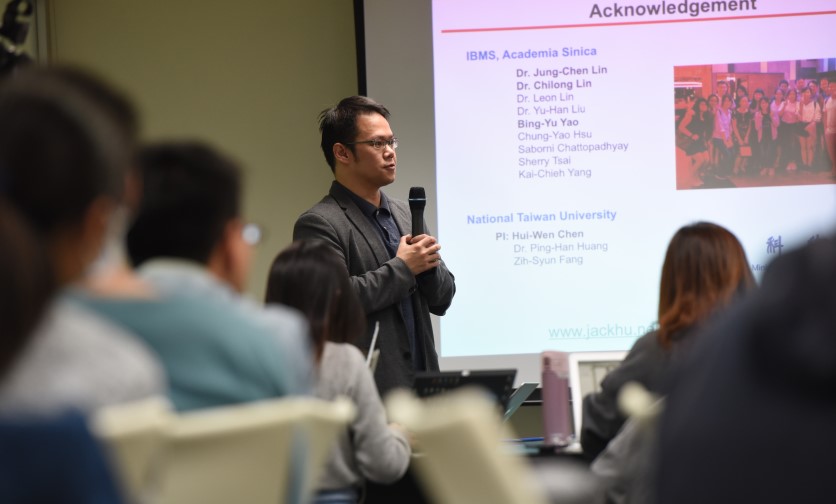Date: 2019-04-03
A research group led by Dr. Che-Ming Jack Hu of the Institute of Biomedical Sciences at Academia Sinica in Taiwan has just published an article describing an innovative approach of constructing hydrogels in cellular cytoplasm to preserve cellular features and functionalities. Cell membranes are highly functional biological interfaces that are very difficult to study and manipulate. As cells lose viability, the loss of cytoskeletal support leads to cell membrane rupture and collapse.
Dr. Hu’s team developed a technique to build artificial cytoskeletons using synthetic hydrogels, which stabilize the cell membrane after cell death. Unlike conventional chemical-based cell fixation approaches that crosslink proteins and deprive them of biological activities, the hydrogel-based approach allows for preservation of membrane functionalities.
The intracellular hydrogelation technique worked so well that the authors showed a gelated antigen presenting cells remained capable of activating cytotoxic T cells even after 3 weeks of storage. The gelated antigen presenting cells were safely administered in mice and triggered antigen-specific T cell proliferation, presenting a potential approach for enhancing immunotherapies.
According to Dr. Jung-Chen Lin, a primary author of the paper, “I was truly blown away by gelated cells' capability when we first incubated cytotoxic T cells with them. We observed T cells dynamically engaging with gelated antigen presenting cells as if the gelated cells were alive. It is amazing how the simple incorporation of synthetic material can dramatically enhance the functionality of biological cells.” Dr. Lin is highly encouraged by the gelated cells applicability in biomedical research and is working with collaborators to study membrane protein dynamics and cell-cell contact signaling using the system.
Dr. Hu, who has been working extensively on biomimetic biomaterials, offers a sci-fi perspective to the work, “We are building ‘cyborg cells’ that contain prosthetic skeletons. The gelated cells retain most surface characteristics of live cells but are much more durable.”Dr. Hu envisions many materials engineering opportunities with the new cell-mimetic system.
Dr. Che-Ming Jack Hu is an Assistant Research Fellow at Academia Sinica’s Institute of Biomedical Sciences (IBMS). Dr. Jung-Chen Lin is a Postdoctoral Research Fellow at the IBMS. The authors collaborated with the Department of Veterinary Medicine of the Taiwan National University with their research being funding by both the Taiwan Ministry of Science and Technology (MOST) and Academia Sinica. The paper presenting the results entitled “Intracellular hydrogelation preserves the fluid and functional cell membrane interfaces for biological interactions” was published online in the journal Nature Communications on March 5th, 2019.
-
Mr. Chung-Hui Chuang, Media Team, Secretariat, Central Administrative Office, Academia Sinica
(02) 2789-8820,chchuang@gate.sinica.edu.tw
-
Chang-Hung Chen, Public Affairs Section, Secretariat, Academia Sinica
(02) 2789-8059,changhung@as.edu.tw
-
Link









 Home
Home

